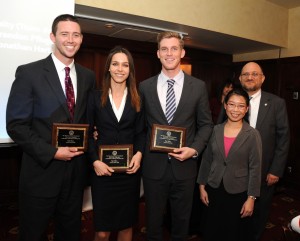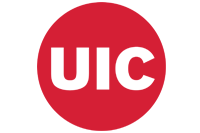
At the 32nd Annual International Moot Court Competition in Information Technology and Privacy Law hosted by Chicago’s John Marshall Law School, members of the Stetson University College of Law took first place honors. Team members (from left) Jonathan Hart, Melaina Tryon and Brandon Pfluger are congratulated by Melinda Tsang, of John Marshall’s Journal of Information Technology and Privacy Law, and Professor David Sorkin.
Students from Stetson University College of Law came away with the top prize at the 32nd Annual International Moot Court Competition in Information Technology and Privacy Law hosted by Chicago’s John Marshall Law School Center for Information Technology and Privacy Law.
During the three-day competition held Oct. 24 – 26, 2013, students examined current issues of privacy invasion from three different aspects—social media, use of photography from a “glass” lens, and infliction of emotional distress. The competition brought together students from the United States, Africa and India.
The team of Melaina Tryon, Brandon Pfluger and Jonathan Hart won the first place award for Stetson. Second place went to a team from Texas A&M School of Law represented by Todd W. Smith, Eliana Albelbaisi and Robert Koehl.
Semifinalist teams were Brooklyn Law School represented by Imre Ilyes, and Ashley Huddleston, and Florida Coastal School of Law represented by Dat Nguyen, Michael Ballou and Heather McGriff.
Christian Dewhurst of South Texas College of Law was named “Best Oralist” and the Texas A&M team took “Best Petitioner Brief” honors. The team of Samuel Bragg, Leslie Brockhoeft and Matthew Vinson of Southern Methodist University Dedman School of Law won “Best Respondent Brief” honors.
The Ambassador Round winners were Divya Jyoti Mehra, Akshita Alok and Rathin Somnath of National Law University in Jodhpur. The Ambassador Round finalists were Ramya Ramachanderan, Ryan Mendonca and Anjali Agarwal of School of Law, Christ University, Bangalore.
The competition problem assigned to participants focused on an appeal from a fictitious movie director, Alfred Bradlo. He was vacationing at a ski lodge when a major blizzard hit the area and all guests were unable to leave. Guest Xavier Yungstein discovered Balbo ill in a bathroom, and secretly took Bradlo’s picture with a “glass” lens-type device. After the photo showed a red blotch on Bradlo’s face, Yungstein alerted lodge staff who assured him there was no problem. Yet Yungstein sent the message via the Internet claiming that Bradlo was ill, possibly with a deadly disease he carried from overseas travel. Bradlo said he’d had an allergic reaction to something he ate. As a result of Yungstein’s actions, Bradlo charged that he suffered depression and anxiety attacks that required medication. The case focused on charges of intrusion of seclusion, false light and intentional infliction of emotional distress.
During the competition, students argued the problem from both Bradlo’s and Yungstein’s positions.
Competitors represented:
· Addis Ababa University, School of Law, Ethiopia
· Baylor Law School in Waco, Texas
· Brooklyn Law School in New York
· Benjamin N. Cardozo School of Law in New York
· Chicago–Kent College of Law in Chicago, Ill.
· Christ University, School of Law in Bangalore, India
· Florida Coastal School of Law in Jacksonville, Fla.
· Lincoln College of Law in Sirhind, Punjab, India
· National Law University in Jodhpur, Rajastan, India
· New York Law School in New York City
· Northern Illinois University College of Law
· Nova Southeastern University in Ft. Lauderdale, Fla.
· South Texas College of Law in Houston, Texas
· Southern Methodist University Dedman School of Law in Dallas, Texas
· Stetson University College of Law in Houston, Texas
· Texas A&M University School Law in Ft. Worth, Texas
· University of California Hastings College of Law in San Francisco
· University of Connecticut School of Law in Hartford, Conn.
· University of Kansas School of Law in Lawrence, Kansas
· University of South Dakota School of Law in Vermillion, SD
· William & Mary Law School in St. Paul, Minn.

